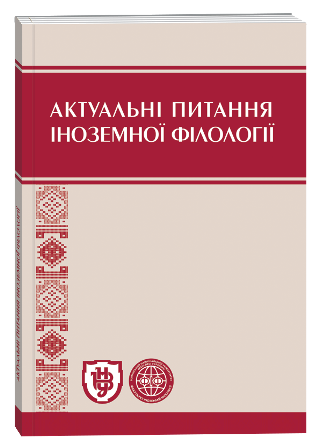VERBALIZATION OF THE CONCEPT BETRAYAL IN I. WELSH NOVEL “TRAINSPOTTING”
DOI:
https://doi.org/10.32782/2410-0927-2024-21-8Keywords:
concept, verbalization, human relationsAbstract
The study of concepts as mental units that reflect reality depending on the individual picture of the world of the native speaker is of particular interest to modern linguists. Under such conditions, it is relevant to identify ways of verbalizing and interpreting concepts. The obtained results make it possible to establish the specifics of the content, structure and means of the concept actualization, to identify the attitude of speakers to a particular phenomenon of extralinguistic reality and the peculiarities of a certain language community perception. The purpose of the study is to identify and analyze the features of the concept of BETRAYAL verbalization. The material for the scientific analysis was novel “Trainspotting” by the British writer I. Welsh. The capitalist world, where a pseudo-moral preoccupation with happiness and goodness supposedly reigns, actually consists in a constant search for pleasure and entertainment. In such a society, the idea of moral categories is distorted. In the novel “Trainspotting” by I. Welsh, the semantic zone “to betray human relations” is represented, which is a component of the concept BETRAYAL semantic structure. In particular, it is about the relations between people in capitalist society, which are compared to a game, and a person, in turn, with game pieces (pawn, game, play). Another aspect of betrayal of relationships is devaluation, which in the novel “Trainspotting” is verbalized as a change in the status of relationships, expressed in the opposition “friend-acquaintance” (friend, mate, associate, acquaintance). Friendship is compared to a trope, a metaphor. Obviously, an indirect hint is made at the use of this concept in a figurative sense. Social ties that are established within professional environments, voluntary associations, political parties, economic organizations, etc., are characteristic of modern industrial, urbanized, capitalist societies of drugs are perceived as a waste of time.
References
Анісімова А.І., Маєвська К.В. Мультилінгвальне дослідження концепту «WORK». English аnd American Studies. 2024. Issue 21. С. 61–66.
Бойко Н.І. Специфіка лексико-семантичного поля концепту «війна» в кіноповісті О. Довженка «Україна в огні». Література та культура Полісся. Том 102. Серія «Філологічні науки». 2021. № 17. С. 116–130.
Веремчук Е.О. Фразеологічні засоби вербалізації концепту DIGNITY в англійській мові. Науковий вісник Міжнародного гуманітарного університету. Сер.: Філологія. 2020. № 45. том 2. С. 53–56.
Дружбяк С. В., Дрібко В. М. Вербалізація концепту смерть у новелах В. Стефаника: корпусобазований підхід. Наукові записки. Серія: Філологічні науки. 2024. № 209. С. 118–125.
Іванова Н.Д. Вербалізація концепту ‘Серце’ в українських народних прислівях. Вісник Дрогобицького національного університету. Серія Б. Гуманітарні науки. 2014. Вип. 1-2. С. 120–124.
Колегаєва І.М. Конструювання номінативного поля концепту: етапи та одиниці. Записки з романо-германської філології. Одеський національний університет імені І.І. Мечникова: ф-т романо-германської філології. Одеса: КП ОМД, 2018. Вип. 1 (40). С. 121–127.
Оверчук О.Б. Семантична динаміка концепту БІЛИЙ у поетичній моделі світу Б.-І. Антонича. Вчені записки ТНУ імені В. І. Вернадського. Серія: Філологія. Соціальні комунікації. 2020. Том 31 (70). № 2. Ч. 1. С. 32–37.
Селіванова О.О. Сучасна лінгвістика: термінологічна енциклопедія. Полтава: Довкілля, 2006. 716 с.
Смаглій В. М. Вербалізація концепту LANGUAGE в англомовних афоризмах. Закарпатські філологічні студії. Ужгород: Видавничий дім «Гельветика», 2023. Т. 2. вип. 32. С. 68–72.
Штомпка П. Соціологія. Аналіз суспільства. Львів: Колір ПРО, 2020. 800 с.
Evans V. How words mean: Lexical concepts, Cognitive Models and Meaning Construction. OUP Oxford, 2009. 400 p.
Hagemann S. Studies in Scottish Fiction: 1945 to the Present. New York: Peter Lang, 1996. 281 p.
Hardt M., Negri A. Empire. Cambridge: Harvard UP, 2000. 478 p.
McRae L. Writing and Resistance: Trainspotting. Essays and Studies in Literary Criticism. 2004. № 13.2. P. 117–33.
Osipchuk H.V. Verbalization Of The Concept Woman In The Poem “Grazhyna” By Adam Mitskievich. Research bulletin. Series: Philological sciences. 2023. P. 100–105.
Powell J. The Secret of Staying in Love. Thomas More Pr, 2017. 176 p.
Redhead S. “Post-Punk Junk.” Interview with Irvine Welsh. Repetitive Beat Generation. Edinburgh: Rebel Inc., 2000. P. 137–50.
Welsh I. Trainspotting. W. W. Norton & Company, 1996. 348 p.







